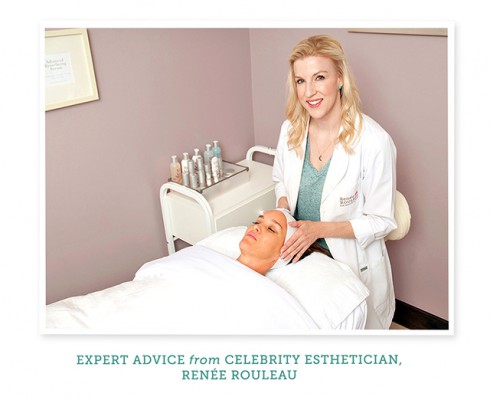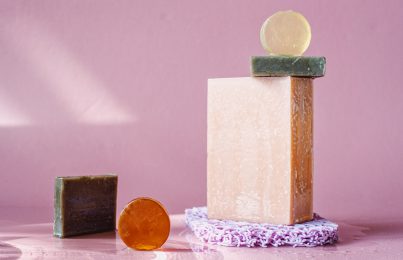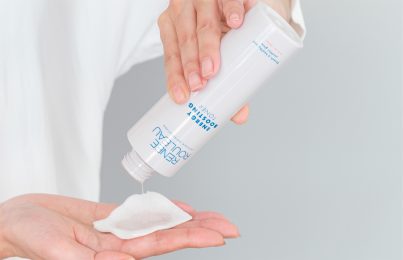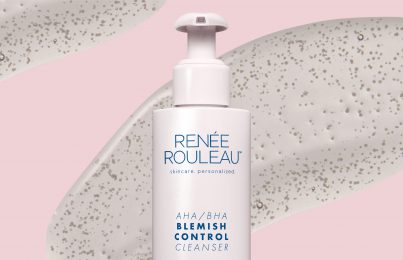Updated 9/7/14. As a licensed esthetician with 25+ years of hands-on experience working with clients (including celebrities), there are certain skin care products that simply do not enhance the results of your skin. In fact, they can be downright harmful to its health visible appearance.
Here is my list of the five worst skin care products that you should avoid using:
1. Bar soap. Washing with a bar of soap no matter how expensive it is or how moisturizing it claims to be is just an absolute no-no. The binders that hold a bar of soap together naturally have a high pH balance, so they are always going to be too strong for the skin. When you wash with something that’s too harsh, you strip the water out of the skin leaving it dehydrated with dry skin cell build up. Then, you have to run and put on moisturizer to put back in what you just took out which makes no sense. Skin cells are like fish, they need water to live and without water they die. Therefore, keeping water in the skin and not removing it, is essential for the health of the skin. Soap manufacturer companies will disagree with me on this one, and while I do understand that certain soaps are less drying than others, I believe they are simply too strong (drying) for the skin than cleansing gels and cleansing lotions. Instead, use a sulfate-free cleansing gel like Luxe Mint Cleansing Gel or cleansing lotion formulated for your skin type.
Note: If you do use a bar of soap and are convinced that it’s not drying your skin out, this may be because you have used it for so long and have gotten used to the tight feeling it leaves on the skin. My suggestion for you is to wash one side of your face with soap and immediately after, wash the other side with a mild sulfate-free cleanser and compare how each side feels. I guarantee that the gentle cleanser side feels much less tight or dry.
2. Alcohol-based toner. In this day and age, I still don’t understand why some companies continue to use denatured alcohol or SD alcohol 40 as a main ingredient in their toners. Many people like the clean and tight feeling associated with using alcohol-based toners on the skin, but this ingredient will strip the skin of water, which results in dead cell build up and dull looking skin. Even if you’re an oily skin type (who tend to be the users of alcohol-based toners), trying to dry up oily skin can backfire as stripped cell buildup traps oil and leads to break outs and more oil production. Toners without alcohol, on the other hand, are very important for removing the drying chlorine and minerals found in tap water. Make sure to use an alcohol-free toner both morning and night after cleansing.
3. Eye creams formulated with the ingredients mineral oil, petrolatum or other heavy oils. Many skin companies formulate eye creams with these ingredients in an effort to compensate for the lack of oil glands around the eyes. Although moisture is most certainly needed in this area, these heavy oils can migrate into the eyes while you sleep and cause you puffiness when you wake up in the morning. When the eyes are puffy, it expands the skin and can weaken elasticity over time which leads to more wrinkles, never mind giving a tired look to your face. Choose eye creams without these ingredients and do look for ones that aren’t excessively oily.
4. Facial cleansing oils. The problem I have with using a cleansing oil to wash your face, is that although they can feel luxurious to use and do leave dry skin types feeling very soft after using it, the concentration of the oils leave a residue and barrier on the skin. This will prevent the active ingredients in your serum or moisturizer (when applied to the skin after cleansing) from getting deep within the skin where they need to go to provide the best benefits. Even if the facial oil appears to wash away easily and doesn’t feel like it left a residue, it does, which is why the skin feels so soft afterwards. The purpose of cleansing is to remove oil, bacteria, dirt and debris from the skin and to provide a clean slate to the skin for the products to use afterwards to absorb deeply. It’s important to do so with a gentle, non-drying cleanser but you want to make sure it’s water-soluble so it rinses away clean without leaving this residue. Serums and moisturizers can create positive change and dramatic improvement in the skin and you don’t want a barrier of oil to interfere with this process. Read: Four Skin Care Ingredients Your Cleanser Should Never Contain
5. Vitamin C serums that sting the skin or turn brown in the bottle over time. Topical use of vitamin C has been proven over and over to be an effective way to slow down the appearance of skin aging when used on a daily basis. However, many vitamin C products out on the market use the acid forms of the Vitamin (like Ascorbic Acid or L-Ascorbic Acid) as the main source of C. These are in fact, acids, which is why you can feel a stinging sensation on the skin. The research on skin aging indicates that daily use of skin irritating acids actually encourage free radical formation, which counteracts the reason why you’re using vitamin C in the first place. Plus, the problem with these acid types of vitamin C is that they are highly unstable. Every time you open the bottle, oxygen gets into the product and begins to break it down. If your vitamin C serum starts to turn brown half way through the bottle, that’s a sign that it is oxidizing and is losing its effectiveness. (Think of an apple that turns brown 20 minutes after taking a bite.) Research indicates one of the most effective forms of topical vitamin C to fight free radicals and reduce the look of skin aging is Magnesium Ascorbyl Phosphate found in Vitamin C&E Treatment. It converts to Ascorbyl Acid once inside the skin, stays stable, and is time-released so it works for up to 8 hours. Additionally, it acts as a natural skin lightener to fade stubborn brown spots from sun damage and post-breakout marks, and it won’t irritate the skin like others will do.
Read: Are Natural Products Better for Sensitive Skin?
Read: The Fountain of Youth: Do Retinol Products Really Get Rid of Wrinkles?
Read: Cleansing Wipes: Are They Good to Use On Your Skin?
Which skin care products are best for you? See our nine skin types or take our Skin Type Quiz and get products recommended.
Need expert advice from a licensed esthetician? Schedule a virtual consultation to get customized advice in person, over the phone or online via Skype or Facetime.
For more expert advice check out the blog. Also sign up for our skin tip e-newsletter, follow Renée Rouleau on Twitter and Instagram and join the discussion on our Facebook page. You’ll be your own skin care expert in no time. Get the #ReneeRouleauGlow!
Celebrity Esthetician & Skincare Expert
As an esthetician trained in cosmetic chemistry, Renée Rouleau has spent 30 years researching skin, educating her audience, and building an award-winning line of products. Her hands-on experience as an esthetician and trusted skin care expert has created a real-world solution — products that are formulated for nine different types of skin so your face will get exactly what it needs to look and feel its best. Trusted by celebrities, editors, bloggers, and skincare obsessives around the globe, her vast real-world knowledge and constant research are why Marie Claire calls her “the most passionate skin practitioner we know.”



